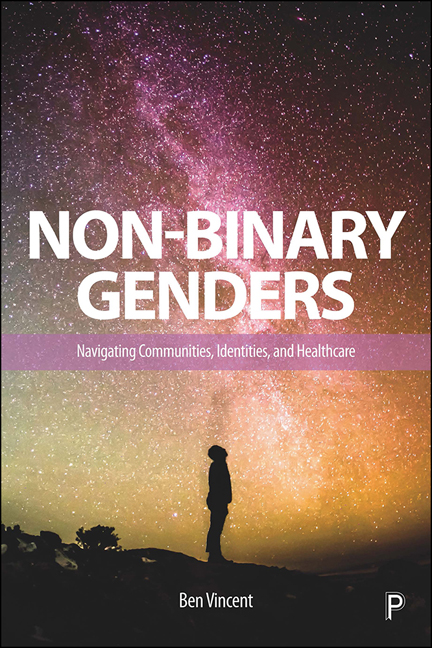Book contents
- Frontmatter
- Dedication
- Contents
- List of Figures and Tables
- Notes on the Author
- Acknowledgements
- Introduction
- 1 Reviewing Non-Binary: Where have we Come From?
- 2 Doing and Being: My Relationship with this Work, and how it was Done
- 3 ‘Not Trans Enough’: The Relationship Between Non-Binary Gender Identities, Uncertainty and Legitimacy
- 4 Non-Binary Times, Non-Binary Places: Communities and their Intersections
- 5 Views of the Clinic: Non-Binary Perceptions and Experiences of General Healthcare Services
- 6 A Strong Motivation to Tick The Boxes: Non-Binary Perceptions and Experiences of Gender Identity Clinics
- Conclusion
- References
- Index
3 - ‘Not Trans Enough’: The Relationship Between Non-Binary Gender Identities, Uncertainty and Legitimacy
Published online by Cambridge University Press: 10 March 2021
- Frontmatter
- Dedication
- Contents
- List of Figures and Tables
- Notes on the Author
- Acknowledgements
- Introduction
- 1 Reviewing Non-Binary: Where have we Come From?
- 2 Doing and Being: My Relationship with this Work, and how it was Done
- 3 ‘Not Trans Enough’: The Relationship Between Non-Binary Gender Identities, Uncertainty and Legitimacy
- 4 Non-Binary Times, Non-Binary Places: Communities and their Intersections
- 5 Views of the Clinic: Non-Binary Perceptions and Experiences of General Healthcare Services
- 6 A Strong Motivation to Tick The Boxes: Non-Binary Perceptions and Experiences of Gender Identity Clinics
- Conclusion
- References
- Index
Summary
Using queerness itself as a category of analysis seems to invite a new round of debate devoted to who is ‘really queer’. A voice that originated from one set of margins begins to create its own marginalized voices. These twin problems of identities – boundaries and hierarchies – emerge whenever we try to base politics on identity. (Wilchins, 2002: 29)
Introduction
Among non-binary people, there is a vast heterogeneity of experiences and self-conceptualisations. Despite such differences, a striking commonality was observed among participants: insecurity in relation to gender. This could manifest as an internal uncertainty over whether one was ‘trans enough’, or fear of not being seen as trans enough by other people. This chapter will explore this phenomenon, while considering how hegemonic gendered expectations affect not only the ability to socially exert, but to internally formulate a non-binary gender identity. This exploration cuts across the original research questions, as feelings of insecurity were manifested in relation to experiences of queer community interaction, everyday experiences and accessing (or concern over accessing) medical support. Further, introspection was, perhaps predictably, strongly influenced by societal gender norms (both within and outside queer communities), which could be internalised, resisted, or both simultaneously.
I begin by highlighting how non-binary people who had not accessed gender-affirming medical services could view those who had as ‘more legitimate’ than themselves, even if they did not want such access. Critically, participants didn't view others who weren't medically transitioning as less legitimate. Rather, they held themselves to different standards of validity, highlighting how the anxiety of ‘realness’ often operated at the level of the self. Participants were self-aware and critical of such feelings as problematic. This may be suggestive of difficulties with, or low self-esteem in relation to, gender identity (Neff, 2003).
I then argue that hegemonic medicalised narratives of what it ‘means to be transgender’ have shaped queer community interactions. I show how community tensions can manifest with regards to non-binary people being made to feel ‘not trans enough’ by other members of trans communities. Binary-oriented trans people could sometimes exhibit hostility towards particular identities, or construct implicit hierarchies of legitimacy in order to self-validate. Such practices serve to evidence the problematic nature of processes where trans/non-binary identities are often only validated (by doctors, the law, family or friends, or in day-to-day social interactions) once difficult or painful processes have been navigated or performed.
- Type
- Chapter
- Information
- Non-Binary GendersNavigating Communities, Identities, and Healthcare, pp. 73 - 100Publisher: Bristol University PressPrint publication year: 2020



